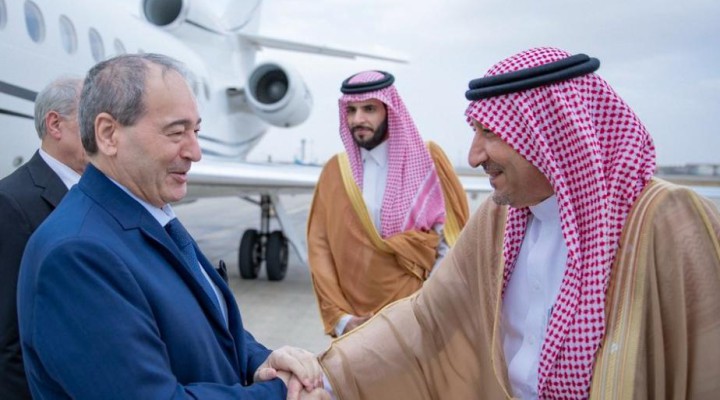The Arab world returns to Syria

The latest Saudi slap to the US rises high hopes in the region
All the Gulf Cooperation Council (GCC) states, along with Egypt, Iraq, and Jordan, have agreed to attend the consultative meeting Saudi Arabia is convening in Jeddah on Friday with a single item on its agenda: Syria’s return to the Arab League. In practical terms, this means President Bashar al-Asad or someone representing him will occupy the ‘vacant’ Syrian seat at next month’s Arab Summit in Riyadh, and most Arab and Gulf embassies in Damascus will reopen in the coming few weeks.
The Arab foreign ministers who accepted Saudi Arabia’s invitation to attend will not be going for consultations. They will be there to rubber-stamp Syria’s return, while also acknowledging Saudi Arabia’s political and economic leadership of the Arab World. Any country that wanted to continue opposing Saudi efforts to rehabilitate Syria would not show up in the first place to spare itself embarrassment.
By bringing Syria back into the Arab League, the Saudi leadership is defying the US and dealing it the latest of a succession of powerful slaps in the face. These included: snubbing President Joe Biden when he visited Riyadh’ rejecting his demands for an increase in oil production; joining forces with Russia and this regard; hosting Chinese President Xi Jinping in Riyadh for three summit-level gatherings (with Saudi, GCC, and Arab leaders); and most recently, signing a reconciliation agreement with Iran under his auspices in Beijing.
The US mobilised 65 countries and with them spent nearly $300 billion on besieging and waging a proxy war in Syria in an attempt to bring down its regime. It now faces a major multi-faceted political and diplomatic defeat: the failure of its attempts to isolate Syria; a revolt by Gulf states led by is a biggest ally (Saudi Arabia) against its hegemony; and the breaking of this siege. It is being proclaimed dead and buried, with the funeral rites to be performed by the Arab foreign ministers who attend the consultative meeting.
The unexpected arrival of Syrian Foreign Minister Faisal al-Miqdad in Riyadh for the first time since 2011 confirmed this. It could be a prelude to two further visits: a visit by the Saudi foreign minister bearing an official invitation to Asad to visit Riyadh — like his recent visits to Abu Dhabi and Muscat – and later to attend the Arab Summit.
The timing of Miqdad’s visit to Riyadh two days before the Jeddah conference makes clear that Syria’s return to the Arab League via the Saudi gateway has become a fait accompli, part of a broader Saudi-led effort to resolve inter-Arab problems and disputes.
There had been two remaining obstacles to Syria’s return: Qatar’s opposition, and Kuwait’s incomprehensible ‘reservations’. This can only be explained by the powerful hold of political Islam in both countries. Qatar spearheaded the expulsion of Syria at the 2013 Arab Summit in Doha and handed its seat to the Syrian opposition in the person of Muath al-Khatib. But its agreement to participate in the Jeddah meeting means this obstacle has been overcome. That was confirmed by foreign ministry spokesman Majed al-Ansari who said Qatar would go along with the Arab consensus on the matter.
Tunisian President Kais Saied, in a move that has overwhelming public support, has also decided to reopen the Syrian embassy in his capital, placing the opposition — which closed it under pressure from the US and at the behest of Turkey when it was in power — in a highly awkward position. It is no secret he has been planning this step for months in coordination with Algeria.
Syria’s triumphant comeback breaks the last links in the chain of the US conspiracy to dismember the country that has ravaged it for the past 12 years. This victory can be attributed to three main factors: the legendary steadfastness of its army and leadership; the strong support of its popular base that withstood much pain and suffering; and the backing of its genuine allies Iran, Russia, and the state and non-state members of the Axis of Resistance, especially Hezbollah.
The welcoming back of Syria is part of a new Saudi policy orientation that seeks to end inter-Arab problems and disputes, gradually decouple from Washington and the West and join the new world order led by China and Russia, and put Arab interests first. This could culminate in the revival of the Arab Summit as an institution and the rebirth of serious and effective collective Arab action. Or so it is to be fervently hoped.
https://www.raialyoum.com/the-arab-world-returns-to-syria/
 TheAltWorld
TheAltWorld 
Guy
It is a miracle in the making .The Israeli gov.or non gov ,depending upon where your head space is, must be trembling in fear and about time .Time to join humanity .NO special people .